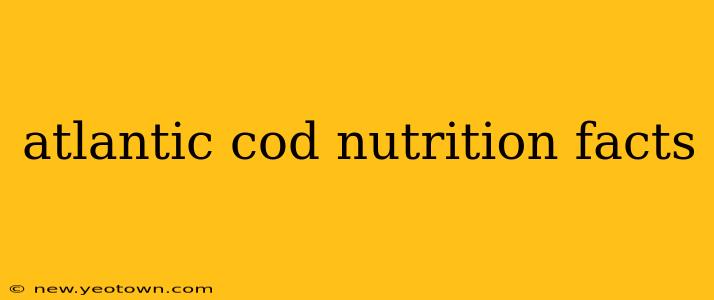The Atlantic cod, a staple in many cuisines worldwide, isn't just delicious; it's a nutritional powerhouse. Its flaky white flesh offers a wealth of benefits, making it a smart choice for health-conscious individuals. But what exactly makes Atlantic cod so nutritious? Let's dive deep into the nutritional facts and explore the reasons why this fish deserves a prominent place in your diet.
What are the Nutritional Benefits of Atlantic Cod?
The story of Atlantic cod's nutritional value begins with its impressive protein content. Imagine a lean, protein-rich powerhouse, readily available and packed with essential amino acids – that's Atlantic cod. This protein is crucial for building and repairing tissues, supporting muscle growth, and boosting metabolism. Beyond protein, Atlantic cod is a fantastic source of several essential vitamins and minerals. Vitamin B12, vital for nerve function and red blood cell production, is abundant. Selenium, a powerful antioxidant that protects against cell damage, is also present in significant amounts. And let's not forget the omega-3 fatty acids, crucial for heart health and brain function, that contribute to Atlantic cod's impressive nutritional profile.
How Many Calories are in Atlantic Cod?
A typical 3-ounce serving of cooked Atlantic cod contains approximately 80-100 calories, making it a low-calorie option for weight management. This relatively low calorie count, combined with its high protein content, makes it an ideal choice for those seeking to maintain a healthy weight while enjoying a delicious and nutritious meal. It's a great way to feel full and satisfied without the guilt.
Is Atlantic Cod High in Mercury?
This is a common concern surrounding seafood consumption. The good news is that Atlantic cod is generally considered a low-mercury fish. While mercury levels can vary based on factors like location and age of the fish, the levels in Atlantic cod are usually low enough to make it a safe choice for regular consumption, even for pregnant women and young children (though always consult your doctor or a registered dietitian for personalized dietary advice).
What are the Health Benefits of Eating Atlantic Cod?
The health benefits associated with regular Atlantic cod consumption are numerous. The high protein content supports muscle growth and repair, while the omega-3 fatty acids contribute to heart health by lowering triglycerides and blood pressure. The presence of vitamin B12 is crucial for neurological health, and the selenium content provides antioxidant protection against cellular damage. These combined benefits make Atlantic cod a truly remarkable food source.
How Does Atlantic Cod Compare to Other Fish?
Compared to other fish, Atlantic cod often stands out for its relatively low fat content and its high protein-to-calorie ratio. While some fatty fish like salmon are richer in omega-3s, Atlantic cod still provides a significant amount. The choice ultimately depends on individual dietary needs and preferences, but Atlantic cod certainly holds its own in the nutritional stakes.
What are Some Healthy Ways to Prepare Atlantic Cod?
To fully enjoy the nutritional benefits of Atlantic cod, opt for healthy cooking methods. Baking, grilling, or steaming are excellent choices, minimizing the addition of unhealthy fats. Avoid deep-frying, as this adds significant calories and fat. Experiment with simple seasonings and herbs to enhance the flavor without compromising its nutritional value.
In conclusion, Atlantic cod is more than just a delicious fish; it’s a nutritional powerhouse that deserves a place in your healthy diet. Its lean protein, vital vitamins and minerals, and beneficial omega-3 fatty acids make it a wholesome and satisfying choice. So, next time you're planning a meal, consider the versatility and nutritional benefits of this incredible fish. Remember always to source your seafood responsibly and choose sustainably harvested options whenever possible.

